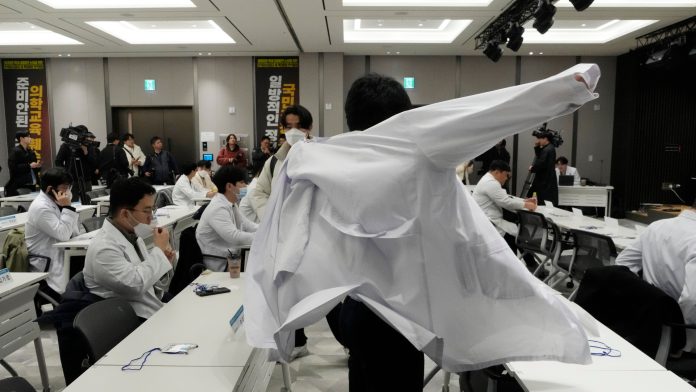The South Korean government intends to finalise a structural transformation plan by next month to enable advanced general hospitals to operate without junior doctors, according to The Korea Herald.
The recruitment of the second half of the year is underway, but even those in charge of the Ministry of Health and Welfare expect the return rate of resigning trainee doctors to be very low, according to the emergency committee of the professors of the so-called Big 6 medical schools.
The uncertain situation in South Korea’s medical community is now in its sixth month, with no sign of trainee doctors returning to hospitals, and the government is attempting to manage institutions such as hospitals without junior doctors. The government provides a number of features that must comply:
- Therefore, modern general hospitals, which have traditionally relied heavily on trainee doctors, should henceforth evolve into physician-centred facilities specialising in intensive and acute care.
- As part of the scheme, hospitals will provide skilled staff such as specialists, while junior doctors who have left should in turn be replaced by teams and physician assistants, and PA nurses will be licensed through the enactment of the Nursing Act.
- In addition, the government will also continue to push for better working conditions, which is one of the requirements of trainee doctors. Working hours for trainee doctors will shrink from 80 to 60 hours per week, and the number of hours they can work continuously without a break will decrease from 36 to 24 hours.
- Advanced general hospitals will focus on rare diseases, as well as acute care and active physician utilisation. In addition, doctors in core medical services, such as those specialising in severe and complex treatments, will receive higher compensation.
- The reimbursement system will also strengthen. Training will come from increasing the number of supervising specialists, and government accountability will increase by supporting training costs.
- Hospitals may choose not to hire trainee physicians, citing lack of qualifications or competence. More than half of the 3,039 professors surveyed said they would not recruit trainees at all in the second half of the year, according to a survey by the Korean Medical Professors Association.
The changed policy demonstrates that the prospects for new doctors next year are in quite a state of limbo due to the unrest over the past six months. Most trainees will opt to enter practice as a GP or join the military rather than return to a teaching hospital.
Noteworthy, the second half of the recruitment of 7,645 junior doctors is due by the end of this month, with only a few doctors expected to apply despite government pledges to do favours for those applying to start training in September.
As a result, most medical students who want to become doctors have also decided not to take the nationwide exam, which will cause a major disruption in the supply of doctors. According to the Ministry of Health, only 5 per cent of the 3,000 fourth-year medical students have applied for the national licensing exam.
